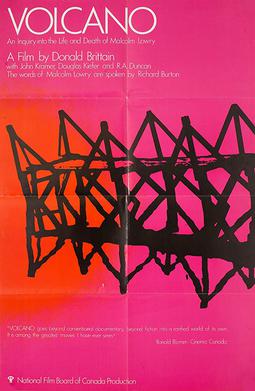Related Research Articles

The National Film Board of Canada is Canada's public film and digital media producer and distributor. An agency of the Government of Canada, the NFB produces and distributes documentary films, animation, web documentaries, and alternative dramas. In total, the NFB has produced over 13,000 productions since its inception, which have won over 5,000 awards. The NFB reports to the Parliament of Canada through the Minister of Canadian Heritage. It has bilingual production programs and branches in English and French, including multicultural-related documentaries.
Roman Kroitor was a Canadian filmmaker who was known as a pioneer of Cinéma vérité, as the co-founder of IMAX, and as the creator of the Sandde hand-drawn stereoscopic 3D animation system. He was also the original inspiration for The Force. His prodigious output garnered numerous awards, including two BAFTA Awards, three Cannes Film Festival awards, and two Oscar nominations.
The 1st Genie Awards were presented on March 20, 1980, and honoured films released in 1979.
Donald Code Brittain, was a film director and producer with the National Film Board of Canada.
Don Owen was a Canadian film director, writer and producer who spent most of his career with the National Film Board of Canada (NFB). His films Nobody Waved Good-bye and The Ernie Game are regarded as two of the most significant English Canadian films of the 1960s.
Colin Archibald Low was a Canadian animation and documentary filmmaker with the National Film Board of Canada (NFB). He was known as a pioneer, one of Canada's most important filmmakers, and was regularly referred to as "the gentleman genius". His numerous honors include five BAFTA awards, eight Cannes Film Festival awards, and six Academy Award nominations.

Volcano: An Inquiry into the Life and Death of Malcolm Lowry is a 1976 documentary film directed by Donald Brittain and John Kramer for the National Film Board of Canada.
Ladies and Gentlemen... Mr. Leonard Cohen is a 1965 National Film Board of Canada documentary about Leonard Cohen, co-directed by Don Owen and Donald Brittain, written by Brittain and produced by John Kemeny.
Fields of Sacrifice is a 1964 documentary by Donald Brittain about Canadian war dead. The film visits former battlefields where over 100,000 Canadian soldiers lost their lives in World War I and World War II and examines Canadian military cemeteries and memorials from Hong Kong to Sicily.
John Spotton C.S.C. was a Canadian filmmaker with the National Film Board of Canada.
John Kemeny was a Hungarian-Canadian film producer whom the Toronto Star called "the forgotten giant of Canadian film history and...the most successful producer in Canadian history." His production credits include The Apprenticeship of Duddy Kravitz, Atlantic City, and Quest for Fire.
Stanley Jackson (1914-1981) was a Canadian film director, producer, writer and narrator with the National Film Board of Canada (NFB).
Derek May (1932–1992) was a Canadian animation, dramatic and documentary film director who worked primarily for the National Film Board of Canada (NFB). Originally a painter, his first film with the NFB was the 1966 experimental short, Angel. His documentary work often focused on the role of the artist in society. His other credits include collaborating the Donald Brittain on the narration for Helicopter Canada.
Never a Backward Step is a 1966 documentary film, produced by the National Film Board of Canada and directed by Donald Brittain, Arthur Hammond and John Spotton.
Henry Ford's America is a 1977 Canadian documentary film produced by the National Film Board of Canada and directed by Donald Brittain, and produced by Brittain, Paul Wright and Roman Kroitor. It has been called one of the best documentaries ever made about the Ford Motor Company and North American car culture.
The 27th Canadian Film Awards were held on October 24, 1976 to honour achievements in Canadian film. The ceremony was hosted by Lorne Greene, and was held at the conclusion of the inaugural 1976 Festival of Festivals.
The 27th Canadian Film Awards were held on October 12, 1975 to honour achievements in Canadian film. The ceremony was hosted by radio personality Peter Gzowski.
The 20th Canadian Film Awards were held on October 4, 1968 to honour achievements in Canadian film. The ceremony was hosted by broadcaster Bill Walker and actress Louise Marleau.
Grierson is a 1973 documentary directed by Roger Blais for the National Film Board of Canada (NFB). It won, among other awards, the 1974 BAFTA Award for Best Documentary.
Arthur Henry Percival Hammond was a Canadian documentary filmmaker, associated with the National Film Board of Canada. He was most noted as codirector with Donald Brittain and John Spotton of Never a Backward Step, which won the Canadian Film Award for Best Feature Length Documentary at the 20th Canadian Film Awards in 1968, and for his 1968 film This Land, for which he was a Canadian Film Award nominee for Best Director at the 21st Canadian Film Awards in 1969.
References
- ↑ Nolan, Brian. "Chapter 22 - Quints and Bureaucrats". Donald Brittain - Man of Film. DigiWire.
- ↑ NFB press release